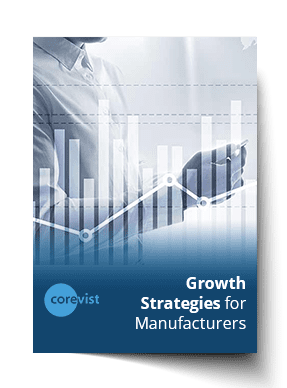Share
Author
Chelsea Raegen
Share
The Purchasing Managers’ Index (PMI) is a vital economic indicator for manufacturing decision-makers, reflecting the financial health and business confidence in the sector. A PMI above 50 signals expansion, while below 50 indicates contraction. When the PMI dips, it can signal challenging times ahead—leading to tighter budgets and postponed investments in new solutions. However, strategic approaches can help manufacturers navigate these periods and secure approvals for essential projects that support sustained business growth.
In times of economic downturn, as indicated by a low Purchasing Managers’ Index (PMI), manufacturers face critical budgetary decisions. Effective budget planning and strategic investments, particularly in B2B e-commerce, become essential to navigate these challenging periods while preparing for future growth. This blog post explores effective budget management strategies and the pivotal role of B2B e-commerce in ensuring a robust return on investment (ROI) during economic contractions.
The Impact of Low PMI on Manufacturing Budgets
A low PMI often leads manufacturers to reassess their financial strategies, focusing on immediate cost reduction and delaying non-essential expenditures. However, understanding how to strategically manage budgets during these periods can make the difference between merely surviving and positioning for recovery and growth.
Key Budgeting Considerations During Low PMI Periods:
1. Prioritization of High-ROI Projects
Investments that promise quick and tangible returns are crucial. For instance, automation technologies that cut labor costs are more likely to be approved due to their direct impact on reducing operational expenses.
2. Flexible Financing Solutions
Leasing or subscription models can defer the financial impact of new investments, facilitating project approval without large initial outlays.
3. Alignment with Strategic Goals
Budgeting decisions should be tightly aligned with the company’s long-term strategic objectives, such as improving operational efficiency or customer retention, to ensure that every dollar spent contributes to overarching business goals.
4. Data-Driven Decision Making
Utilizing advanced analytics to guide budgeting decisions helps allocate resources efficiently, maximizing the impact of each investment.
5. Scalability of Solutions
Starting with smaller, scalable projects allows for adjustments based on economic recovery, reducing initial risk and expenditure.
Amplifying ROI with B2B E-commerce Solutions
During economic downturns, investing in B2B e-commerce platforms can significantly enhance ROI by improving operational efficiencies, expanding market reach, and optimizing customer interactions.
Benefits of B2B E-commerce Investments:
1. Increased Operational Efficiency
B2B e-commerce platforms streamline sales processes, reducing the need for manual interventions and consequently lowering operational costs.
2. Market Expansion
Digital platforms enable manufacturers to reach broader markets without the significant costs associated with establishing physical presences, thus driving revenue growth even during downturns.
3. Enhanced Customer Experience
Providing a seamless, intuitive online purchasing experience can significantly improve customer satisfaction and retention, crucial for maintaining revenue streams during challenging times.
4. Informed Strategic Decisions
Real-time insights gained from e-commerce interactions facilitate more accurate inventory management, tailored marketing strategies, and improved customer service.
5. Cost-Effective Scalability
E-commerce platforms offer the flexibility to adjust operations quickly in response to market changes, allowing for dynamic resource management and cost savings.
The takeaway
Strategic budget planning and investment in B2B e-commerce are key to navigating the challenges posed by low PMI periods. By focusing on scalable, high-ROI projects and leveraging digital platforms, manufacturers can not only weather economic downturns but also lay the groundwork for sustained growth. The flexibility, efficiency, and expanded market reach provided by B2B e-commerce platforms make them an invaluable tool for manufacturers aiming to thrive in both current and future market conditions.
NEW Report:
Growth Strategies for Manufacturers
Every manufacturer needs to grow in the digital age. Here’s the ultimate guide to growth strategies for manufacturers. Read now.









